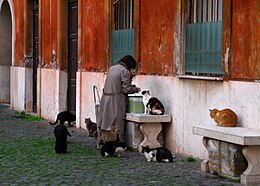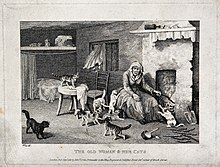
A cat lady is a cultural archetype or stock character, most often depicted as a middle-aged or elderly spinster or widow, who has many cats. The term may be pejorative, or it may be affectionately embraced.
Usage and association

Women who have cats have long been associated with the concept of spinsterhood, widowhood or even witchcraft. In more recent decades, the concept of a cat lady has been associated with "romance-challenged (often career-oriented) women". The term "cat lady" has also been used as a pejorative term towards women without children, regardless of if they actually own cats.
Depending on context, the ordinarily pejorative word "crazy" may be prepended to "cat lady" to indicate either a pejorative or a humorous and affectionate label. Some writers, celebrities, and artists have challenged the gender-based "Crazy Cat Lady" stereotype, and embraced the term to mean an animal lover or rescuer who cares for one or multiple cats, and who is psychologically healthy. Naftali Berrill, Ph.D., Director of the New York Center for Neuropsychology and Forensic Behavioral Science, told AOL Health, "These may be people who have a very hard time expressing themselves to other people. They may find the human need for affection is met most easily through a relationship with a pet." This devotion can sometimes signal mental or emotional issues such as depression. A cat lady may also be an animal hoarder who keeps large numbers of cats without having the ability to properly house or care for them.
Toxoplasma gondii
Some studies indicate a link between the parasite Toxoplasma gondii, which sexually reproduces exclusively in cats, and numerous psychiatric conditions, including obsessive compulsive disorder (OCD) and schizophrenia, whereas other studies have showed that T. gondii is not a causative factor in later psychoses. The compulsive hoarding of cats, a symptom of obsessive compulsive disorder (OCD), has long been associated with "crazy cat ladies". Crazy cat-lady syndrome is a term coined by news organizations to describe scientific findings that link Toxoplasma gondii to several mental disorders and behavioral problems.
Notable examples
- Edith Ewing Bouvier and her daughter Edith Bouvier Beale had many cats living with them in their decrepit home Grey Gardens. Reportedly, some 30 cats lived in the house by the time Little Edie sold it in 1979.
- Bertha Rand was Winnipeg's notorious Cat Lady, who for years battled her neighbours and city hall to save her dozens of cats; even years after her death, she still holds a place in Canadian popular culture. The Venetian Snares song For Bertha Rand, from the 2001 album Songs About My Cats, pays homage to her, and Maureen Hunter's play The Queen of Queen Street is based on Rand's life.
- In the U.S. presidential election of 2024, in an interview on "Fox and Friends", Republican vice presidential candidate J.D. Vance received pushback when he called the leadership of the country "a bunch of childless cat ladies who are miserable at their own lives".
See also
References
- ^ Blakeley, Kiri (15 October 2009). "Crazy Cat Ladies". Forbes.
- "Opinion | How JD Vance plans to punish childless Americans". MSNBC.com. 1 August 2024. Retrieved 3 August 2024.
- "The Weird Intellectual Roots of J.D. Vance's Hatred for "Cat Ladies"". The New Republic. ISSN 0028-6583. Retrieved 3 August 2024.
- Ramirez, Mark (5 August 2009). "Do you believe in the Crazy Cat Lady?". TimesUnion.com. Archived from the original on 3 December 2013. Retrieved 30 November 2011.
- Gostin, Nicki (15 September 2015). "Beth Ostrosky Stern: I am a crazy cat lady... and I'm proud of it". NYDailyNews.com.
- "It's time to smash the 'crazy cat lady' stereotype". MNN - Mother Nature Network.
- Williams, David. "Meet the Men Proud to Be Crazy Cat Ladies". ABC News. Retrieved 12 November 2015.
- Huso, Deborah (November 2009). "Some Live Among Hundreds of Cats". AOL Health. Archived from the original on 19 November 2009.
- Davis, Susan; Flaherty (illus.), Jake (September 2002). "Prosecuting Animal Hoarders is like Herding Cats" (PDF). California Lawyer: 26, 28, 29, 67. Archived from the original (PDF) on 29 May 2010. Retrieved 26 June 2011.
- ^ McAuliffe, Kathleen (6 February 2012). "How Your Cat Is Making You Crazy". The Atlantic. Archived from the original on 3 June 2013. Retrieved 3 June 2013.
- Webster, Joanne P.; Kaushik, Maya; Bristow, Greg C.; McConkey, Glenn A. (1 January 2013). "Toxoplasma gondii infection, from predation to schizophrenia: Can animal behaviour help us understand human behaviour?". The Journal of Experimental Biology. 216 (1): 99–112. doi:10.1242/jeb.074716. ISSN 0022-0949. PMC 3515034. PMID 23225872.
- Gatewood, Johanzynn (22 February 2017). "Cat ownership not linked to mental health problems, study says". CNN.
- Solmi, F.; Hayes, J. F.; Lewis, G.; Kirkbride, J. B. (31 July 2017). "Curiosity killed the cat: No evidence of an association between cat ownership and psychotic symptoms at ages 13 and 18 years in a UK general population cohort". Psychological Medicine. 47 (9): 1659–1667. doi:10.1017/S0033291717000125. PMC 5939988. PMID 28222824.
- Moran, D.J.; Patterson, Jennifer L. (16 June 2011). "When More Isn't Enough". Psychology Today.
- Skloot, Rebecca (9 December 2007). "'Cat Lady' Conundrum". The New York Times. Archived from the original on 18 January 2017.
- Quinn, Sally; Solway, Diane (8 April 2009). "Weditor's Blog: Sally Quinn on Life in Grey Gardens". W magazine. Archived from the original on 6 June 2011.
- From the CBC archives: Winnipeg's cat lady Bertha Rand
- "The Queen of Queen Street". Signature Editions. Retrieved 25 February 2015.
External links
![]() Media related to Cat ladies at Wikimedia Commons
Media related to Cat ladies at Wikimedia Commons
| Stock characters | |||||||||||||||||||||||||||||||||||||||||
|---|---|---|---|---|---|---|---|---|---|---|---|---|---|---|---|---|---|---|---|---|---|---|---|---|---|---|---|---|---|---|---|---|---|---|---|---|---|---|---|---|---|
| |||||||||||||||||||||||||||||||||||||||||
| |||||||||||||||||||||||||||||||||||||||||
| |||||||||||||||||||||||||||||||||||||||||